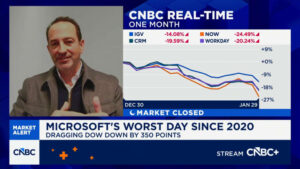March marked the ninth month in a row of overall inflation decreases, according to the Labor Department’s consumer price index report released Wednesday.
The consumer price index rose 5% for the past 12 months through March, down from 6% in February. That’s the slowest annual increase in nearly two years, a welcome sign for consumers and the Federal Reserve. Prices for all goods and services rose 0.1% for the month compared with a 0.4% increase in February.
But that overall CPI includes fuel and food, which have volatile prices. The slowdown primarily reflects the impact of lower fuel prices, which have been declining sharply since their peak in June 2022. Energy costs dropped 3.5% from the previous month and decreased 6.4% over the past year. The annual food index remained unchanged from the previous month but is still up 8.5% over the last year.
So don’t celebrate just yet — annual core inflation, which excludes food and energy, increased from 5.5% in February to 5.6% in March. It’s the first annual core inflation increase in nine months. The month-to-month increase changed little: 0.4% for March compared with 0.5% in February.
The data sends mixed signals to the Federal Reserve, which has been the primary challenger for inflation. In the Fed’s efforts to tame inflation, the Central Bank has hiked the federal funds rate nine times since March 2022. The overall CPI peaked at 9.1% in June 2022 and has declined since, but the Fed’s long-run inflation target is 2%.
The Fed is largely expected to add an additional rate increase at its May meeting.
Here are some other notable price changes from the March CPI report:
-
Shelter, which includes rent, was the largest contributor to the increase, the Labor Department said. Shelter increased 0.6% from February to March — compared with 0.8% in the previous month-over-month — and is up 8.2% over the last year.
-
Food at home — groceries — decreased 0.3% from February to March but is still up 8.4% over the last year.
-
Gasoline declined by 4.6% from February to March and is down 17.4% over the last year.
-
Used cars and trucks, once a significant contributor to inflation, decreased 0.9% from February to March and are down 11.2% over the last year.
This post was originally published on Nerd Wallet







